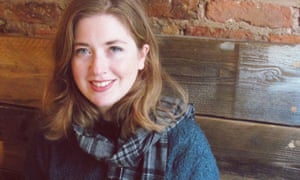What makes a Man Booker novel?
Fiona Mozley on Elmet
Fiona Mozley on Elmet
Ahead of the announcement of the 2017 prize next week, the stories behind the stories
Saturday 14 October 2017 08.00 BST
Fiona Mozley on Elmet
Fiona Mozley. Photograph: Hodder & Stoughton
Several years before I started Elmet, I began writing a novel about a group of friends who were newly graduated from university and attempting to make their way in the world. It was narrated by a woman, taller than average, with reddish hair, glasses and literary aspirations. Let’s call her Leona Bozley. Leona had moved to London and was living in a shared house. She went to coffee shops a lot. She spent a great deal of time thinking about her feelings and discussing politics. She had relationship “drama”.
I never finished this novel and I never will. I cringe when I think about it. The plot was dull; the main character vapid (it turns out that my own personality does not translate well to the page); and most of all, I hated writing it. The life I was fictionalising was not bringing me very much pleasure, and describing it, then reading it back, was not especially enjoyable either.
I had used my writing as a kind of therapy. Although this is not a problem in itself – many of my favourite writers do something similar to great effect, and I have read several novels in the last year that are clearly autobiographical and absolutely wonderful – it didn’t work for me. I wrote pages of monotonous monologue and pulled my punches whenever something remotely interesting happened. I knew that if I ever wrote anything else, it would have to take me away from the familiar. It would have to transport me.
Elmet tells of characters whose experiences are very different from my own. It is narrated by a 14-year-old boy, Daniel. His father, known as “Daddy”, is a giant of a man who fights for pay in bareknuckle bouts. His sister, Cathy, is ferocious and unpredictable. Their lives are not comfortable but precarious. They live on the margins of society and are desperate for some stability and a place to call home. They build a house for themselves by a copse in the West Riding of Yorkshire, but they do not own the site and, inevitably, the landowners, a quasi-feudal oligarchy, begin to circle.
Since Elmet’s publication in August, I have been asked frequently where these characters and this story came from. There are certain answers that are easy: I was inspired by the landscape of home. This is true. I grew up in York, just north-east of the contested territory, an area in which I used to cycle with my dad and which was partly encompassed by the catchment area of my school. The origins of the plot are less easy to pinpoint. The rhythms, tone and narrative arc are explicitly those of a western, as are many of the characters and the concerns at the novel’s core. Land. Men. Violence. These are the hinges. However, when I began writing there were also a plethora of social issues I wanted to explore. I am not certain this is the best way to start a novel, but I did not necessarily know if I would ever write another, so, perhaps naively, I decided to give it a go.
Indeed, when I think back on the many competing ideas I decided to include, it surprises me that the novel has any sort of coherence at all. For one, I wanted to examine the tensions between certain political agendas. I resolved to set up a situation where the principal concerns appear to be those of class, labour and property ownership, but for that to all give way when the expectations of gender come to be tested. I likewise tried to create moments in which the limits of the human body are presented alongside cultural conceptions of those limits. Cathy, a teenage girl, is terrified by the prospect of becoming the victim of male aggression. Growing up, girls are confronted by images, often romanticised, of assaulted or murdered girls, and I suppose I wanted to touch upon the psychological impact of these vignettes. Cathy is tormented by the apparent inevitability of violence, and much of her energy, and the energy of the novel, comes from her endeavours to overcome this.
There were, then, competing interests and lofty ambitions. If Elmet were going to work as fiction, if it were to entice and entertain, it required a narrator thatwho observed rather than interjected, and who hinted at these ideas or conveyed the sense of them unpretentiously, without proselytising. Cue Daniel, the lost boy.
Elmet is published by JM Originals.
THE GUARDIAN
The 2017 Man Booker Shortlist Is Heavy on Americans and Debut Novelists
Surprised by the Booker shortlist? Don't judge the books, study the judges
My writing day / Fiona Mozley / I’m on the Man Booker shortlist and top of my fantasy football leagueWhat makes a Man Booker novel? / Fiona Mozley on Elmet
2017 Man Booker Prize shortlist / The best and worst lines
Review / 'Elmet,' by Fiona Mozle
Surprised by the Booker shortlist? Don't judge the books, study the judges
My writing day / Fiona Mozley / I’m on the Man Booker shortlist and top of my fantasy football leagueWhat makes a Man Booker novel? / Fiona Mozley on Elmet
2017 Man Booker Prize shortlist / The best and worst lines
Review / 'Elmet,' by Fiona Mozle






No comments:
Post a Comment